It is perfectly correct to begin a sentence with “moreover.” You can use “moreover” to start sentences in formal and informal writing. Also, “moreover” is always a continuation of the previous sentence and means “furthermore.” E.g., “Today was hot. Moreover, we forgot the sunscreen.”
The term “moreover” essentially means the same as “also” or “additionally.” You use it when you want to add more information to whatever came before it.
When “moreover” is at the beginning of a sentence,it can also be joined to the previous sentence.
- All participants agreed that we could use their data. Moreover, they signed confidentiality agreements.
Furthermore, although you can use “moreover” in a new sentence, you can also connect two sentences by using a semicolon.
- All participants agreed that we could use their data; moreover, they signed confidentiality agreements.
Are you still having doubts about using “moreover” in formal writing? Keep reading the rest of the page, where we describe how to include “moreover” at the beginning of a sentence. Furthermore, we’ll show you some synonyms to use in either formal or informal contexts.
Can You Start a Sentence With “Moreover” in Formal Writing?
It is correct and widespread to start a sentence with “moreover” in academic and formal writing.
The term “moreover” means “additionally” or “furthermore.” It always follows from the previous sentence and adds more information or emphasis.
- He has lost the trust of voters. Moreover, he lost seats in the election.
However, you can also connect “moreover” to the previous sentence by using a semicolon.
- He has lost the trust of voters; moreover, he lost seats in the election.
“Moreover” is a formal word and you can use it in essays and academic writing. However, there are alternative words and phrases that you can use in formal writing instead of “moreover” if you want to mix up your language. Here are some of them:
- Besides
- Furthermore
- In addition
Can You Start a Sentence With “Moreover” in Informal Writing?
You can start sentences in informal writing with “moreover,” and there is no rule that states it is incorrect.
However, “moreover” is somewhat formal. Therefore, it is more likely that you will see it in informal business emails rather than in daily messaging between friends and family members.
In extremely informal messaging, people use other synonyms more often than “moreover.” For example:
- Also
- And
- As well
Nonetheless, here are some examples of how “moreover” looks in an informal context:
- We are having the annual meeting on Tuesday. Moreover, your appraisal is on Wednesday.
- The flight was canceled. Moreover, there were no hotel rooms available.

